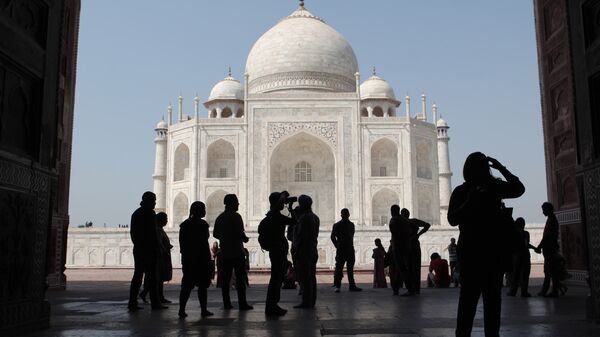New Delhi (Sputnik): The more than a decade old legal battle between the Indian state and the body that handles properties dedicated by Muslim philanthropists for religious purposes has taken a new turn, with the Supreme Court of India demanding the Sunni Wakf Board to produce documents signed by Mughal Emperor Shah Jahan dedicating the Taj Mahal as a religious endowment.
The apex court, on Tuesday, heard the petition filed by the Archaeological Survey of India (ASI) against the Sunni Wakf Board's 2005 decision to declare the world famous monument Taj Mahal as a property of the Wakf.
READ MORE: India Puts Time Limit on Visiting the Epitome of Love — Taj Mahal
According to news reports, senior advocate V. V. Giri, representing the Wakf Board, argued that Emperor Shah Jahan had executed a wakfnama (deed) in favor of the board. To this, the three-judge bench of the Supreme Court remarked, "Then you show us the original deed executed by Shah Jahan. Show us the signature."
#UPwaqfbord battling with #archeologyserveyofIndia on #TajMahal ownership asked by @SCofInd to produce #TajMahal ownership documents signed by @MughalEmpror #ShahJahan pic.twitter.com/k9SPdPRzZu
— Ramesh Kumar (@kumarairveteran) April 11, 2018
Chief Justice of India (CJI) Dipak Misra also questioned how the Wakf Board came into the picture while tracing the history of the Taj Mahal. He argued that Emperor Shah Jahan was under house arrest by his son Aurangzeb until he died in 1666 and that the emperor himself viewed the Taj Mahal from his prison.
"How did he (Shah Jahan) sign the wakfnama (deed)? He was in jail and used to view the monument while in custody," the chief justice of India asked.
The court also observed that such unfounded arguments were only wasting the judiciary's valuable time.
READ MORE: Beauty and the Bugs: India Launches Probe As Taj Mahal Turns Green
"Who in India will believe it (Taj Mahal) belongs to Wakf Board? These kinds of issues must not waste the time of the Supreme Court," the bench comprising Chief Justice of India Dipak Misra and Justices A. M. Khanwilkar and D. Y. Chandrachud said.
The Archaeological Survey of India (ASI) argued that under the 1858 proclamation, properties taken over from the last Mughal Emperor Bahadur Shah Zafar by the British rulers vested with the Queen and was later taken over by the Indian government by the 1948 act, therefore there was no question of the involvement of a Wakf Board.


